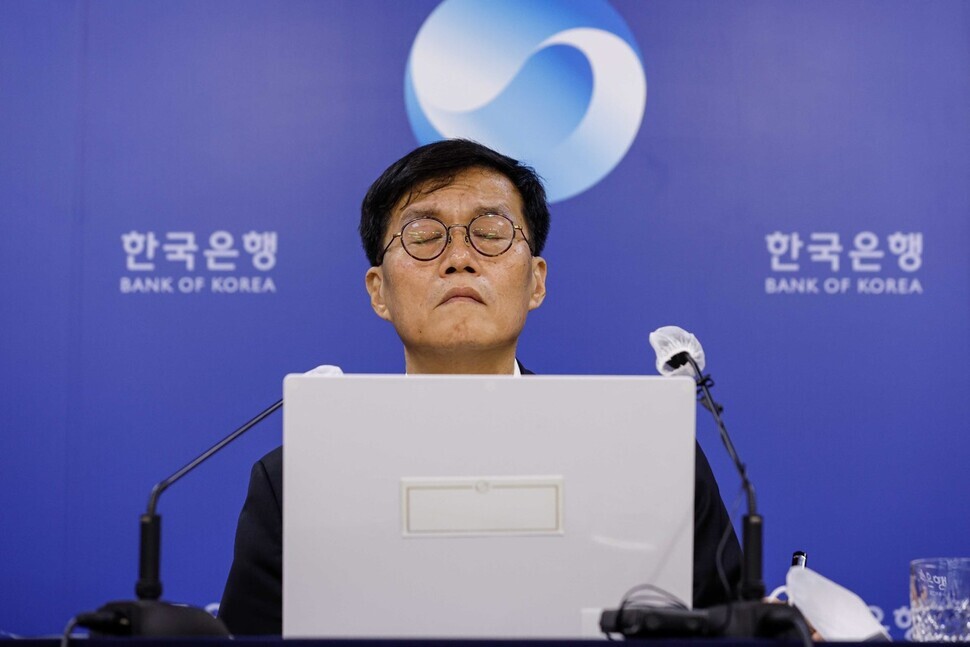hankyoreh
Links to other country sites 다른 나라 사이트 링크
BOK takes first-ever “big step,” hiking interest rate to 2.25%

On Wednesday, the Bank of Korea’s Monetary Policy Board raised the standard interest rate from 1.75% to 2.25% a year, taking the “big step” of raising the interest rate by 0.50 percentage points — twice the typical markup of 0.25 percentage points — for the first time in the history of South Korea's central bank.
With this marking the era of low interest rates, which had continued for over seven years and maintained the standard interest rate at below 2% a year, all economic agents — including groups vulnerable to interest burdens — will likely have to wade through a prolonged period of suffering in which they will have to adjust to an altered macroeconomic environment where high interest rates and inflation are the norm.
Speaking to the press shortly after the monetary policy decision meeting that day, Bank of Korea (BOK) Governor Rhee Chang-yong said, “The increase by 0.50 percentage points today is a truly exceptional situation.”
“For the future interest rates, we’re considering incremental increases of 0.25 percentage points each to respond to prices through the rest of the year, rather than another ‘big step,’” he added.
“The market’s expectation that our interest rate will reach the range of 2.75%–3.00% by the end of the year is natural and reasonable,” he said.
Rhee’s announcement signaled clearly to the market that with Wednesday’s big step representing a measure to counter investors’ expectations of inflation, the BOK intends to rule out another big step as much as possible, in favor of incrementally increasing the rate by 0.25 percentage points at a time at the remaining three monetary policy decision meetings of 2022 in August, October, and November.
Commenting on when inflation will peak — the most crucial prerequisite for the anticipated future interest rate channel — Rhee explained, “The Monetary Policy Board members are predicting that the peak will be reached late in the third quarter or early in the fourth, and also that [prices] will remain high for some time, declining gradually rather than falling abruptly.”
In particular, he emphasized that core inflation — not including energy and food prices, which are heavily influenced by external factors such as high oil prices and rising global grain prices — has risen by over 4%.
“Core inflation, which is not strongly correlated to business conditions, is too high, and the Monetary Policy Board is responding preemptively before inflation accelerates or becomes entrenched,” he explained.
Responding to fears that the latest major interest rate hike could slow economic growth, he said, “With increasing factors that are likely to put a strain on business conditions in the second half of the year, the annual growth rate is clearly going to be somewhat lower than the revised projections of 2.7% for this year and 2.4% for next year that the BOK issued last May.”
At the same time, he stressed, “We believed [the growth rate] will remain in the mid-2% range this year and the low 2% range next year, which would be higher than our potential growth rate [estimated at around 2.0%].”
South Korea’s benchmark interest rate has remained at a low level of under 2% ever since March 2015, when it reached 1.75%. With the rate now raised to match its August 2014 level of 2.25% per annum, the long era of low interest rates is essentially over.
“With this increase in the interest rate, some adjustments to real estate and stock prices appear to be inevitable,” Rhee said.
“Rather than continuing to assume that the interest rate and prices will both remain in the 0%–2% range as they have for so long, it’s recommended that those involved in economic activity anticipate higher interest rate and inflation risks as a result of this situation,” he urged.
The 0.50-percentage point interest rate hike Wednesday was unanimously approved by the six members of the central bank’s Monetary Policy Board.
By Cho Kye-wan, senior staff writer
Please direct questions or comments to [english@hani.co.kr]

Editorial・opinion
![[Column] When ‘fairness’ means hate and violence [Column] When ‘fairness’ means hate and violence](https://flexible.img.hani.co.kr/flexible/normal/500/300/imgdb/original/2024/0516/7417158465908824.jpg) [Column] When ‘fairness’ means hate and violence
[Column] When ‘fairness’ means hate and violence![[Editorial] Yoon must stop abusing authority to shield himself from investigation [Editorial] Yoon must stop abusing authority to shield himself from investigation](https://flexible.img.hani.co.kr/flexible/normal/500/300/imgdb/original/2024/0516/4417158464854198.jpg) [Editorial] Yoon must stop abusing authority to shield himself from investigation
[Editorial] Yoon must stop abusing authority to shield himself from investigation- [Column] US troop withdrawal from Korea could be the Acheson Line all over
- [Column] How to win back readers who’ve turned to YouTube for news
- [Column] Welcome to the president’s pity party
- [Editorial] Korea must respond firmly to Japan’s attempt to usurp Line
- [Editorial] Transfers of prosecutors investigating Korea’s first lady send chilling message
- [Column] Will Seoul’s ties with Moscow really recover on their own?
- [Column] Samsung’s ‘lost decade’ and Lee Jae-yong’s mismatched chopsticks
- [Correspondent’s column] The real reason the US is worried about Chinese ‘overcapacity’
Most viewed articles
- 1Could Korea’s Naver lose control of Line to Japan?
- 2[Column] Welcome to the president’s pity party
- 3[Column] US troop withdrawal from Korea could be the Acheson Line all over
- 4Naver’s union calls for action from government over possible Japanese buyout of Line
- 5[Editorial] Korea must respond firmly to Japan’s attempt to usurp Line
- 6Korea cedes No. 1 spot in overall shipbuilding competitiveness to China
- 7[Editorial] Yoon must stop abusing authority to shield himself from investigation
- 8[Column] When ‘fairness’ means hate and violence
- 9Korean opposition decries Line affair as price of Yoon’s ‘degrading’ diplomacy toward Japan
- 10Second suspect nabbed for gruesome murder of Korean in Thailand, 1 remains at large